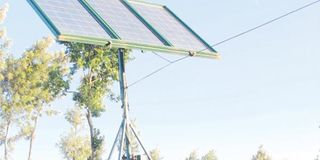Tired of erratic rains? Try this solar irrigation kit

A solar pump that Mr Peter Kimani, a farmer in Ngecha, Limuru uses to irrigate his farm. PHOTO | DENISH OCHIENG
What you need to know:
- Kimani says he embraced the solar irrigation kit from Sun Culture, an agro-solar company, about a year ago.
- Charles Nichols, one of the co-founders of Sun Culture, tells Seeds of Gold that lack of use of irrigation in the country is what made them come up with the solar irrigation project.
News that the rains may fail this planting season have made farmers restless. Majority of farmers have crossed their fingers hoping that the sky would open and the rains would pour in torrents for their crops to grow.
However, as a good number of farmers across the country pray for the rains, Peter Kimani, 45, is not worried about crop failure.
On his three-and-a-quarter-acre farm in Ngecha location, Kiambu County, Kimani is using an irrigation kit that has made his crops, which include cabbages, carrots, kale, spinach and coriander flourish.
“The rains have become too erratic. You cannot depend wholly on them as a farmer and excel. They once failed me and I learnt my lesson.”
Kimani says he embraced the solar irrigation kit from Sun Culture, an agro-solar company, about a year ago.
“A team from the company came in this area to contact a pilot project among farmers. After seeing how it works, I embraced the kit. Using the equipment has made farming easier for me.”
The kit, according to the farmer, has cut his expenses. “All one needs to have is a borehole or any other source of water. Then the machine will use solar power to pump water from the source to the farm.”
Kimani has a 35 metres deep borehole, three 100 watts solar panels, a pump and a tank.
“The energy comes from the sun through the panels, which pump water from the borehole that goes straight to the tank. Afterwards, the water comes out with gravity and goes to the farm,” he explains.
According to Kimani, he bought the solar irrigation kit at Sh360,000. “I was among the pioneer farmers who acquired the gadget. The money might seem much but if you compare to losses farmers make when rains fail, it is worth it.”
The irrigation kit has enabled him plant his crops round the year.
“I always alternate different crops on my farm. I can plant 6,000 heads of cabbages, and once they mature and I harvest, I move to onions and so forth,” says Kimani, who sells the cabbages for at least Sh30 per head.
If it is the season of onions, Kimani will earn Sh150,000 a month from the 25 tonnes harvested. Nairobi town, Wangige and Ngache are the main places he sells his produce.
Charles Nichols, one of the co-founders of Sun Culture, tells Seeds of Gold that lack of use of irrigation in the country is what made them come up with the solar irrigation project.
“One of the pressing issues is lack of irrigation; we live in a country that does not have reliable rains. Thus, we need irrigation to boost our food production.”
With the solar kit, farmers don’t incur high costs associated with electricity, petrol and water pumps.
“A farmer does not have to start with the Sh360,000 kits. There are smaller kits that go for Sh10,000,” says Samir Ibrahim, Nichols’ partner at Sun Culture.




